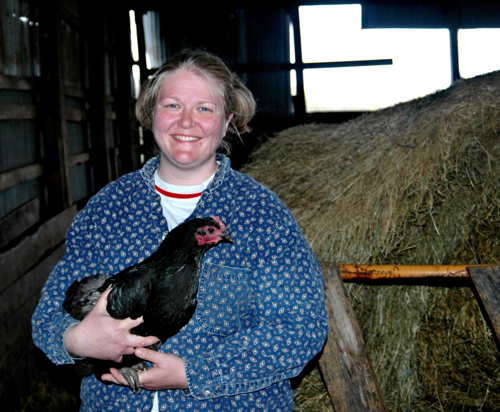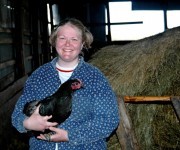 Photo: Cathrine Windyk
Photo: Cathrine Windyk
Inga Haugen may look a little like Heidi, but she’s a modern-day farm girl through and through.
In 1993, her family moved to the small town of Canton, Minn. (population less than 400), to Springside Farm, 230 acres of rolling hills and grazing land that was then a hobby farm. Her mother, Bonnie, wanted to run a working farm; she figured it would be a way to earn a living while she raised three children: Inga, now 30, Olaf, now 27, and Thor, now 24. Springside was in one of the worst places to farm in the county, with steep hills and runoff issues, but the family (her father, Vance, kept a town job) turned it into a viable, seasonal, dairy operation.
Haugen went off to college and worked in a library before moving back to the farm three years ago because she was homesick for the land. She signed on for a stint running the family dairy business, an operation on the small side of medium, with some 100-150 cows, whose milk is sold through Swiss Valley Farms Cooperative.
A little over a year ago, Haugen handed over the reins of the dairy business to her brother Olaf, and launched her own sustainable ranching enterprise, Farmgirl at Large, located within Springside Farm. She raises chickens, pigs, and cattle in a pasture-based system. She also has a fledgling oyster mushroom business. Recently, we heard from Haugen about what it’s like to be, as she calls herself, “a young, female, seasonal, sustainably minded, contrary farmer.” In addition to farming with a smaller footprint than many, Haugen has also been outspoken about the need for health care for small-scale food producers.
Q. Is farming in your DNA?
A. Absolutely. I call myself a third-generation farmer, but when I traced my family lineage in Norway as far back as I could, we’re something like the 15th generation of farmers. As I like to point out, everyone has a farmer in his or her family tree. You only have to go back about four generations to find someone farming in the family in some shape or form.
Q. What appeals to you most about working the land?
A. I love being able to go out in my own backyard to see the ladies [cows]. It’s just my dog and I, and we look after the ladies and produce quality food for people that I feel good about. It’s gorgeous out here. The animals are lovely. Milk is healthy. It’s a good life.
Q. Can you describe your company, Farmgirl at Large?
A. It’s a very small-scale operation: I generally have 10-20 pigs at a time, 75-100 chickens at a time, and about three beef cattle a year. I wanted to do something that was an offshoot of the existing farm business, but under my own steam. I like the synergies of the business. The pigs drink the waste milk. The chickens roam and pick up bugs that enhance their flavor and help the cows. The bulls, which are grass-fed, produce incredibly lean meat, and catch the ladies we might have missed through A.I. [artificial insemination]. So it’s very much a business that complements and diversifies the existing farm.
Q. Why did you start a website with the same name?
A. My website, Farmgirl at Large, is a venue to explain the philosophy behind my business, but it’s also a place where I can be an ambassador for all things agriculture — I was a dairy princess in high school, I had a crown and a sash and I got to ride around in parade floats and advance the dairy industry through public service — that kind of advocacy comes easily to me. I can talk about agriculture for hours.
Q. What are some of the challenges of running a small-scale farm?
A. The professional and personal are inextricably intertwined. I live in my workplace and I work from my home. There is always more I could do. Maybe an electric fence is sagging, so it’s shocking all the time and needs fixing. Maybe some hay bales need moving. There’s this triple bottom line around health that’s hard to keep in balance: the physical farm, the business side, and your own well-being. It also appalls me that people leave farming because they can’t afford to give up a town job that comes with health benefits. Health care is a huge issue for people who farm the land. [Editor’s note: Inga went to D.C. last summer with The Center for Rural Affairs to lobby on behalf of small business owners for continued work on health-care reform.]
Q. What do you do to reduce the environmental impact your farm has?
A.: Keeping the 230 acres in grass is the first thing. We’ve got highly erodible land and regular slopes, too. More grass equals more held water, like [in] a sponge, as opposed to topsoil erosion and sheeting water into our creeks and waterways. We used managed rotational grazing to allow access to vulnerable areas sparingly and appropriately. I try to stack enterprises, so one set of “waste” can be used elsewhere. Every time you make a system more efficient, you reduce the energy inputs, which is positive environmentally. First reduce, then reuse, then recycle. We reuse the water [from the milk chilling system] to wash down the barn, which is [then] held until we can use it when the fields need irrigation.
Q. Can you describe your philosophy around raising livestock for slaughter?
A. I love animals. Working with critters is my favorite part of farming. I work hard to accommodate the needs, wants, and likes of the animals in my care. Pigs are naturally curious, so they’re given something new to play with every now and again. Cattle are herd animals, so I try to make sure they’re never isolated. These are simple quality-of-life issues, beyond adequate living quarters, water, and quality food, but they make a big difference to the animals. I’m an omnivore, and I stole my approach to raising animals for meat from a friend: Every animal should only have one bad day in its life and wake up not knowing when that day arrives.
Q. What’s it like being in an area where the majority of the meat is produced in an industrial fashion?
A. I get some funny looks, but I do business with the same families [who run the big farms] when they buy a half a hog from me for their own freezer. A lot of farmers raise the food they eat in totally separate ways from anything they sell, so people selling and eating the same things [is] seen as being a bit on the odd side.
Q. Can you outline your position on the organic issue?
A. We’re not a certified organic farm, though we adhere to organic principles where we can, and there’s nothing inherently wrong with them. Where they don’t work for me is when I have a sick cow in the herd. I want that animal to have a healthy, positive life, and if I see a cow that needs a little bit of help, then I will give it an injection of antibiotics. We use medicines but we do so sparingly. And, of course, we don’t sell that milk.
Q. Do you have thoughts about the Farm Bill?
A. Yes, how long do you have? The Farm Bill is complex, it has so many parts, and a lot needs to change. I was appalled to find out about the secret Farm Bill; I’ve been following the developments on Food Democracy Now! The Farm Bill needs to have transparency for people to have any faith in what happens with it. Oversight too. I think it’s reprehensible that certain interests are playing hardball about the programs that benefit our most vulnerable populations — I’m thinking here of SNAP [Supplemental Nutrition Assistance Program], Farm to School, and school lunch. I understand that we need to think about efficiencies of scale, and yet the lack of diversity in agriculture and the increase in monocrops by Big Ag — to the point where we have only five foods grown on a large scale — is criminal.
Q. What’s next?
A. I’d like to add some sheep in the mix. I enjoy working with those animals and people often ask for lamb. There are some competition concerns in terms of grazing land and the cows and some fencing issues, but I think it’s an option worth exploring for the future.
Q. Do you see yourself as a farmer for life?
A. I do. My dad says you shouldn’t turn your hobby into your profession, but farming runs so deep for me. I think it would kill me not to farm.




